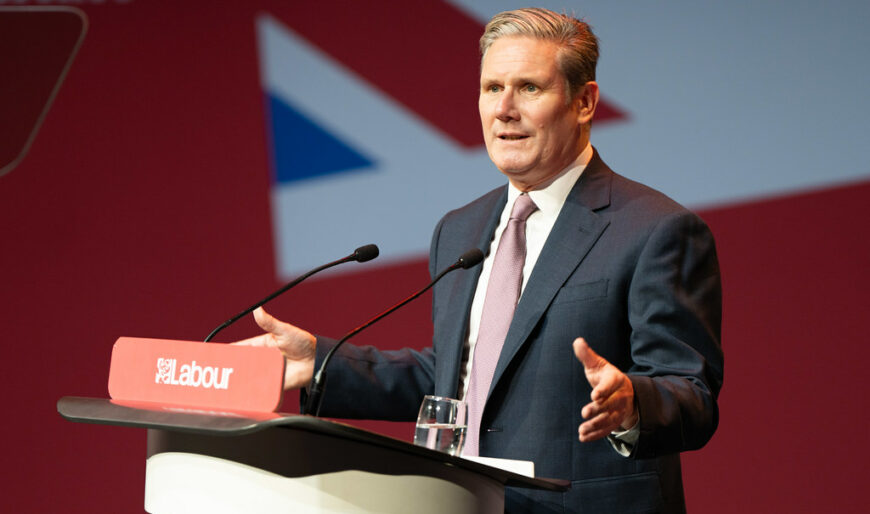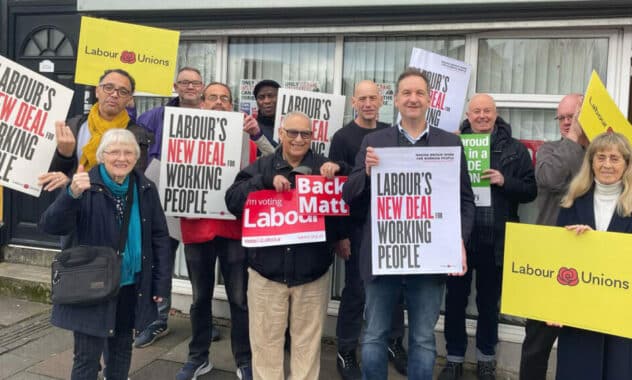Unions and business leaders lobby Starmer over workers’ rights
Fears grow party is poised for another U-turn akin to ditching of £28bn green pledge as business groups call for pragmatism

After the drastic pruning of Labour’s £28bn green prosperity pledge, some within the labour movement are concerned that workers’ rights could be the next on the agenda, as the Labour Party prepares for what is expected to be a “brutal” election campaign.
With Labour’s poll lead making a Starmer-led Labour government look highly probable, business groups are starting to focus on the detail of the party’s policies.
There have been various reports in the press of lobbying efforts by business leaders, aiming to persuade the party to ‘soften’ it’s plans. That has, in turn, led unions to argue for the full implementation of the ‘New Deal for Working People‘. Yesterday, a number of unions joined a lobby of MPs calling on the Labour Party to honour the New Deal, if elected to government.
Newly elected general secretary of the PCS union, Fran Heathcote, said:
“I am pleased that trade unions are joining forces for this important event. A Labour government must end the outsourcing of public facilities contracts. The current model is broken and riddled with institutional racism. We need to expose that taxpayers are funding outsourcing giants whose sole interest is to prioritise profits at the expense of their employees and public services.”
The workers’ rights plan, negotiated with Labour’s trade union affiliates and developed over several manifestos, includes a ban on zero-hours contracts, a new system of “fair pay agreements” in social care, employment rights from the first day of a job and an end to “fire and rehire”.
However, doubts are being raised within the labour movement. The general secretary of the Unite the union, Sharon Graham, has pointed to areas where she claims the new deal for working people has been diluted – complaining that Labour is now promising to stop “exploitative” zero-hours contracts, reading this as a signal that the party is backing away from an outright ban.
Others point to clear evidence of back-tracking on key pledges. The Guardian report Hannah Peaker, the director of policy at the New Economics Foundation, as saying:
“The new deal for working people has been under attack for quite a long time now. The parts that businesses were most concerned about – you’ve already seen some watering down there.”
She pointed to the shift from promising a “single status” of worker when the New Deal for Working People was first announced in 2021, to merely offering a consultation on moving towards the idea.
IER Chair Lord John Hendy KC and Professor Keith Ewing developed the Single Status for Workers policy alongside successive Shadow Ministers for Employment Rights, including Laura Pidcock and Andy McDonald MP. It was a central plank in Labour’s plans for a Ministry of Labour from 2015 onwards.
In January 2022, McDonald said:
“All workers should be given the same rights and protections, including rights to sick pay, holiday pay, parental leave [and] protection against unfair dismissal.
A single status for all will also clamp down on bogus self-employment, and unscrupulous employers will no longer be able to treat their staff like regular employees while falsely claiming they are not.
If the government was really interested in levelling up, it would throw its weight behind this Bill and ensure that it becomes law without any unnecessary delay.”
The original document stated that there should be a single status of ‘worker’, meaning that employment rights will apply to all who work for a living, unless they are genuinely self-employed and running their own business. This would apply ‘regardless of sector, wage, or contract type’, and that everyone ‘will be afforded the same basic rights and protections’ – it would apply specifically to ‘sick pay, holiday pay, parental leave, protection against unfair dismissal and many others’.
Concerns were expressed by Professor Ewing and Lord Hendy in July 2023, when Keir Starmer’s speech at GMB Congress ommitted mention of single status:
“It is to be hoped that the omission of this commitment in Starmer’s speech is an oversight on the part of its author. Failing to address this anomaly will continue to deny the most vulnerable to the most basic protections and will contradict Starmer’s commitment to eliminate ‘insecure jobs and bad work, with a stand-aside State’. It would also contradict his concern that ‘nobody does their best work if they’re wracked with fear about the future if their insecure contract gives them no protection to stand up for their rights at work’. “
Those close to the Labour leader, however, insist that Starmer isn’t about to abandon his workers’ rights pledges. The Guardian lays out three reasons for this:
“Labour insiders point to three reasons why the party is not poised for a full-blown U-turn on workers’ rights, akin to its abandonment of the £28bn green pledge.
The first is the unions’ vehement support for the package. While Starmer’s Labour has been building up links with wealthy individual donors, the unions are still an essential source of financial support, as well as being woven into Labour’s governance structure – and providing a ready pool of on-the-ground activists.
Michael Jacobs, a professor of political economy at the University of Sheffield, says:
“I don’t think it is the next domino to fall: I think the lobby for it inside the Labour party is much stronger than the lobby for the green stuff.”
Kate Bell, the assistant general secretary of the Trades Union Congress, confirms that the workers’ rights package is the unions’ top priority.
“We believe the package of levelling up workers’ rights is absolutely vital – not just to deliver workers the job security they deserve at work, but also transform our economy so that we have an economy that is based on good quality work, productive work, investment in people, investment in businesses rather than a race to the bottom.”
The second reason the workers’ rights plan is not about to be scrapped is that it is regarded as a solid retail offer to working-class voters, and is easier to discuss on the doorstep than Starmer’s overarching “missions”.
Policies such as an end to zero-hours contracts have featured prominently in recent byelection campaigns, including October’s victory over the Scottish National party in Rutherglen and Hamilton West. And Rayner’s team insist much of the preparatory work for implementing the package is well under way.
The third factor in favour is Starmer’s buy-in. While he is often criticised for lacking a fully worked-through political project, he has frequently pointed to the need to ensure working people have respect and security – highlighting his care worker sister, for example.
Starmer-watchers say this may be the closest thing the leader has to a personal credo. In his speech to the Labour party conference last year, he used the phrase “working people” 21 times, promising to create “a Britain built to last. Where working people are respected.”
And he is clearly primed for a backlash, telling Labour’s recent business conference: “We are going to level up workers’ rights in a way that has not been attempted for decades. And that might not please everyone in the room or the wider business community.
“But nobody can doubt that our labour market is at the heart of our challenges on productivity.” In other words, Starmer and his shadow chancellor, Rachel Reeves, see increasing workers’ rights as an integral part of their plan for delivering economic growth.
While ditching the workers’ rights plan appears highly unlikely, however, even the most determined optimists about Labour’s proposals say the details of how they are enacted will be critical – and vulnerable to external pressure.”
Nervousness remains that, in the heat of an election battle and with a press hostile to many of the measures, pressure might be too much to bear. There could hardly be a more important issue to define a new Labour government. Last July, Lord Hendy and Professor Ewing reiterated the point thus in Tribune:
“So, as the manifesto for the next election comes into view, there is a need for a focus on workers’ rights that reflects the commitments made in A New Deal. If trade unions are to be strengthened, it must begin with legal measures that expand collective bargaining coverage.
If workers’ rights are to be strengthened, it must begin with measures that close loopholes and ensure that employment rights apply equally to everyone. Otherwise we are poised—intentionally or otherwise—simply to repeat the mistakes made by the Blair governments.”







